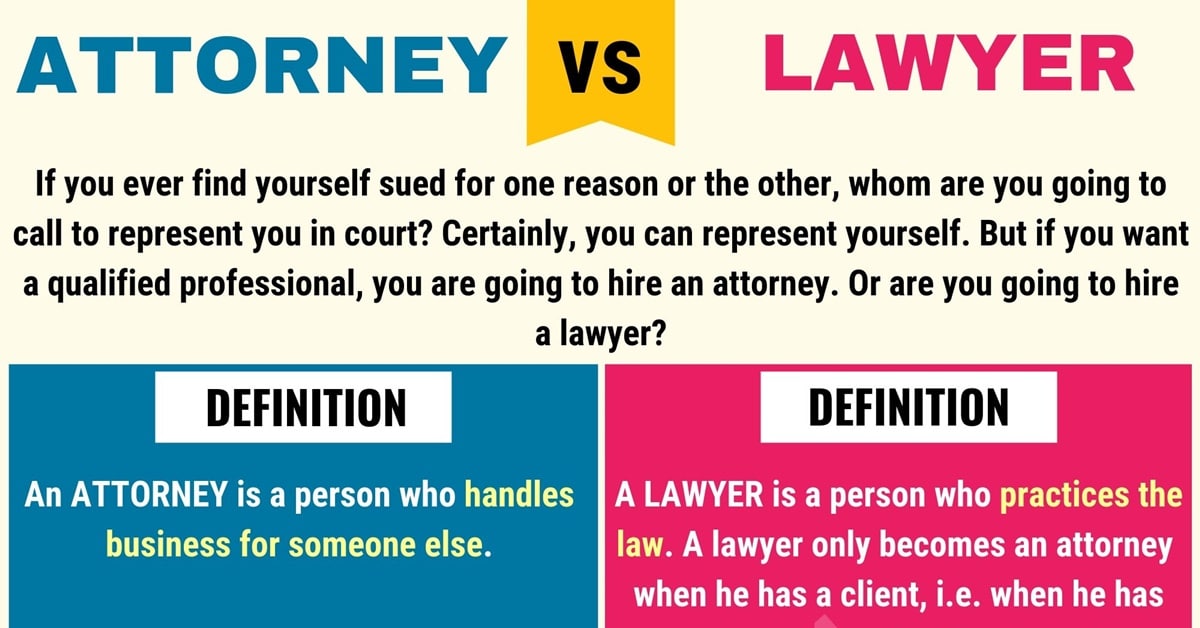Attorney vs. Lawyer: Understanding the Legal Landscape

Many people use the terms "attorney" and "lawyer" interchangeably, but is there actually a difference? In the legal field, both terms generally refer to a professional who is qualified to advise and represent clients in legal matters. However, there are subtle distinctions and regional variations that can be important to understand.
This article delves into the nuances of attorney vs. lawyer, exploring their legal definitions, differences in usage, and the factors that influence which term is more appropriate in certain contexts.
The Intertwined Meanings:
At their core, both "attorney" and "lawyer" signify a licensed professional who has completed the necessary education, passed the bar exam, and is authorized to practice law. They are both trained to analyze legal issues, provide advice, draft legal documents, negotiate on behalf of clients, and represent them in court proceedings.
Therefore, for the majority of situations, using either term is perfectly acceptable and understandable.
Defining the Terms:
-
Attorney: The term "attorney" is more common in American English and typically refers to a lawyer who has been granted the right to act on behalf of a client in legal matters. It often carries a connotation of authority and representation, emphasizing the lawyer’s role as an advocate for their client’s interests.
-
Lawyer: The term "lawyer" is more general and is used across various English-speaking countries. While it encompasses the same professional qualifications as "attorney," it may sometimes be used more broadly to describe anyone who practices law, even individuals who engage in legal research or advising without directly representing clients in court.

Regional and Professional Variations:

It is important to note that the usage of "attorney" and "lawyer" can vary depending on geographical location and professional context.
-
United States: "Attorney" is widely used and generally accepted as synonymous with "lawyer." However, some states have specific legal statutes that define "attorney" as a licensed professional authorized to practice law, while "lawyer" may be used more informally.
-
United Kingdom and Other Commonwealth Countries: "Solicitor" and "Barrister" are the primary legal professions, with more specific roles and responsibilities. "Lawyer" is a broader term encompassing both solicitors and barristers, as well as other legal professionals who may not practice law but work in the legal field.
-
Corporate Law: In corporate settings, "attorney" is often used to refer to lawyers who specialize in business law, while "lawyer" may be used for general legal counsel.

When to Use Which Term:
While both terms are generally interchangeable, there are certain situations where one might be more appropriate than the other:
-
Formal Legal Settings: In court proceedings, legal documents, and professional correspondence, "attorney" is the preferred term.
-
Client Communication: When speaking with clients, "attorney" or "lawyer" can be used, depending on personal preference and the relationship established.
-
Descriptive Contexts:
When describing someone’s profession broadly, "lawyer" may be more suitable. For example: "She is a successful lawyer specializing in intellectual property law."
Ultimately, the best term to use depends on the specific context and intended audience.
Beyond the Terminology:
While understanding the nuances of "attorney" vs. "lawyer" is helpful, it is essential to go beyond mere terminology and focus on the core qualities and responsibilities of a legal professional:
-
Ethical Conduct: Attorneys and lawyers are bound by strict ethical codes, ensuring they act with integrity, honesty, and loyalty to their clients.
-
Client Advocacy: Their primary duty is to zealously advocate for their clients’ interests, protecting their rights and navigating the complexities of the legal system.
-
Legal Expertise: Attorneys and lawyers acquire in-depth knowledge of the law through education, training, and experience, enabling them to provide informed legal counsel and representation.
-
Problem-Solving Skills: Legal professionals are skilled problem-solvers, analyzing legal issues, identifying potential solutions, and effectively advocating for their client’s desired outcome.
By recognizing both the subtle distinctions and the shared core values of the legal profession, individuals can navigate the legal landscape with greater understanding and confidence. Whether you encounter an "attorney" or a "lawyer," remember that both designations represent professionals dedicated to upholding the rule of law and providing valuable legal services to individuals and organizations.
